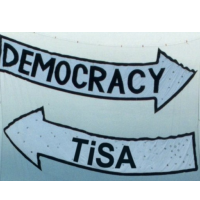Privacy Activists Alarmed by Details of Secret U.S. Trade in Services Negotiations with EU and 23 other Countries

The Trade in Services Agreement (TiSA) agreement being negotiated by the Obama administration with representatives from 23 other nations, mostly in Europe and South America, but also including Japan, South Korea, Australia and Israel, has provisions that could allow personal data to be stored in other countries.
Unlike the Trans-Pacific Partnership, which deals mostly with goods, TiSA is intended to regulate services, such as the Internet. This concerns privacy advocates, particularly those in Europe, where governments are more concerned with such issues.
Emma Woollacott at Forbes says TiSA, if adopted, could bar countries “from trying to control where their citizens’ personal data is held or whether it’s accessible from outside the country.”
Margot Kaminski at Slate expanded on this point, saying draft language contained in TiSA says governments would not be allowed to prevent a foreign services company “from transferring, [accessing, processing or storing] information, including personal information, within or outside the Party’s territory.”
“Essentially,” Kaminski wrote, “this says that privacy protections could be treated as barriers to trade. This language could strike most privacy regulations as they apply to foreign companies—and not just in the EU. It would also apply to U.S. regulation of foreign companies at home. For instance, U.S. health privacy law requires patient consent for health information to be shared. This, technically, is a restriction on transferring information that could be invalidated by TiSA, if nothing changes.”
Alarm bells started going off about TiSA on Wednesday, when WikiLeaks released draft text of what Kaminski called “the biggest international agreement you’ve probably never heard of.”
TiSA was originally proposed by the governments of the United States and Australia in early 2012 and formal talks started in March 2013.
TiSA has some provisions, such as the ability to prevent censorship, which may benefit Americans. However, since the treaty is being negotiated in secret, there’s no way for people to judge if the good points outweigh the bad. And if Congress gives the Obama administration fast-track authority, there will be no way for the Senate to do anything but give an up or down vote on the agreement.
-Noel Brinkerhoff, Steve Straehley
To Learn More:
Wikileaks Releases Documents Related To Controversial U.S. Trade Pact (by Sam Thielman and Phillip Inman, The Guardian)
Privacy Is Not a Barrier to Trade (by Margot E. Kaminski, Slate)
Another Leaked Trade Agreement, Another Reason to Oppose Fast Track (by David Singh Grewal, Huffington Post)
Leaked TISA Documents Reveal Privacy Threat (by Emma Woollacott, Forbes)
Trade in Services Agreement (WikiLeaks)
- Top Stories
- Unusual News
- Where is the Money Going?
- Controversies
- U.S. and the World
- Appointments and Resignations
- Latest News
- Trump to Stop Deportations If…
- Trump Denounces World Series
- What If China Invaded the United States?
- Donald Trump Has a Mental Health Problem and It Has a Name
- Trump Goes on Renaming Frenzy






Comments